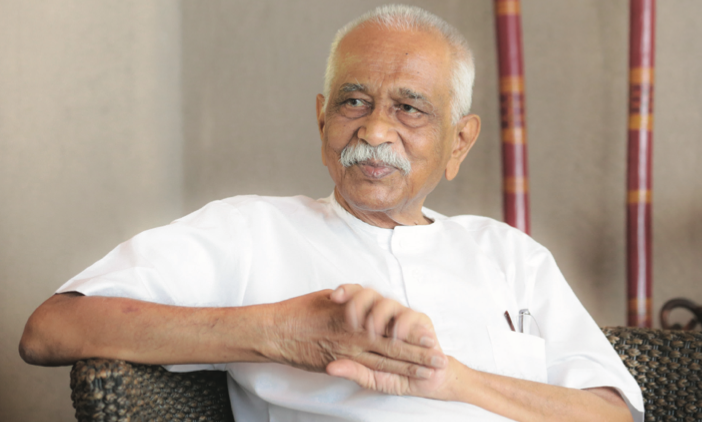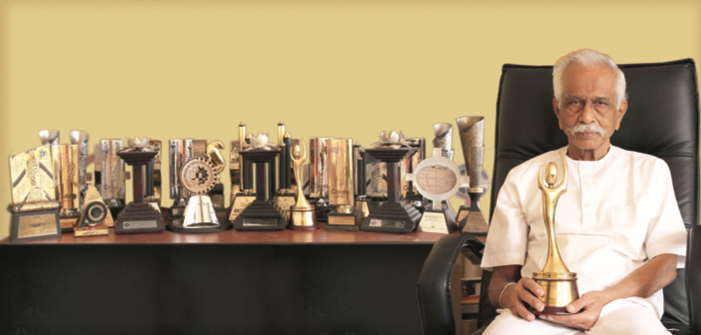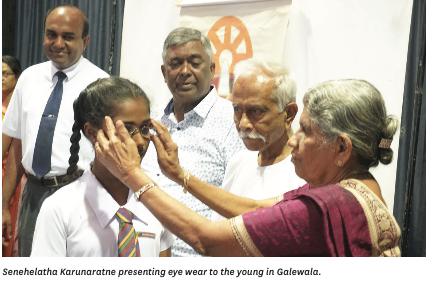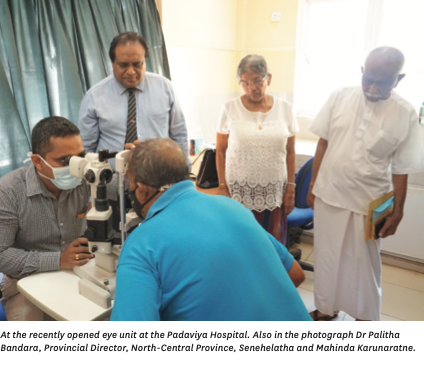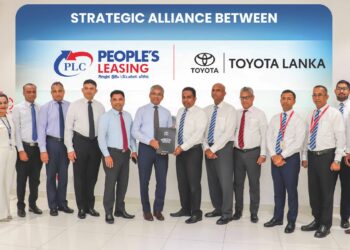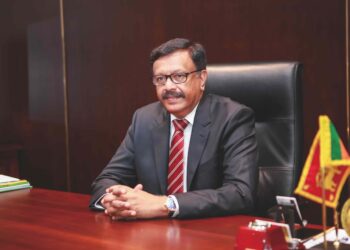Mahinda Karunaratne, Founder/Chairman of Karunaratne and Sons has traversed on a path of hard work, commitment and always trusting his inner ‘gut’ feeling. He says having the knowledge of English paved the way for his successes as it enabled him to communicate with a diverse clientele. His journey is one of pure determination. In 2003, during his 70th birthday he handed over the business to his children. Thereafter he engaged on a life of social service through the Karuna Trust, where he single-handedly manages all aspects of the operations. Eye care is a main aspect of the social work that they do and Mahinda Karunaratne believes that giving sight to a person who has had the sight but lost their sight, is one of the greatest merits.
By Udeshi Amarasinghe. Photography: Menaka Aravinda.
Mahinda Karunaratne, Founder/Chaiman of Karunaratne and Sons, and Chairman of Karuna Trust.
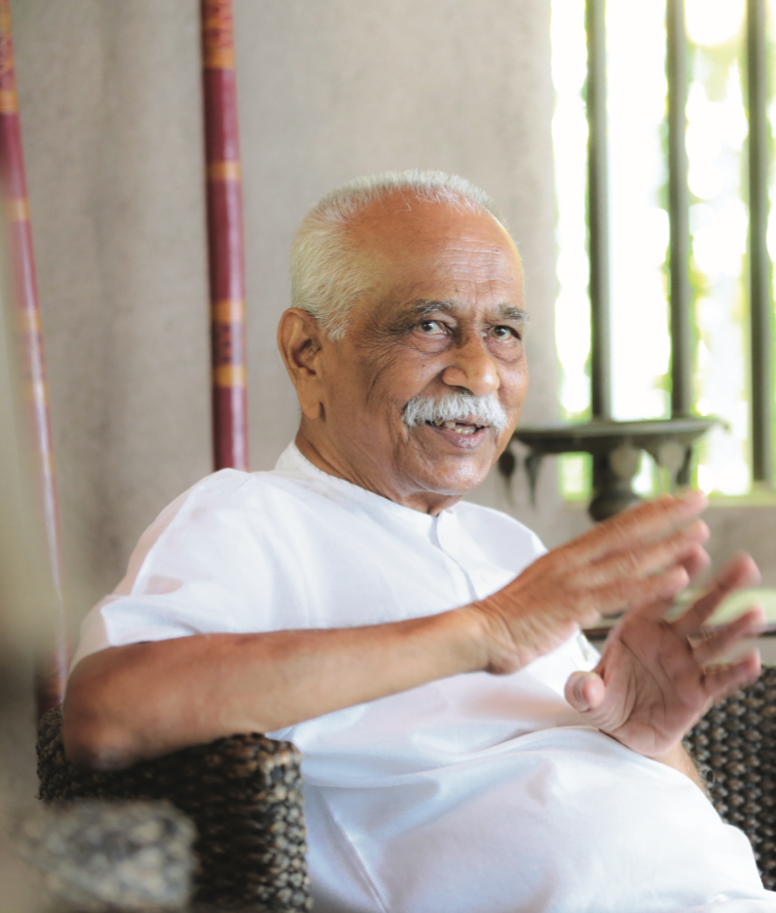
Can you tell us how you started, the reason why you got into printing?
I started my printing business in September 1970, and Karunaratne and Sons celebrates its 50th anniversary this month. It happened unexpectedly because I was initially involved in the tea business. I was managing the business together with my brothers where I had given them 50 percent of the ownership as well. We had three vans in the company and an island-wide distribution. However, after marriage I realized that my brothers were not working the same way and the company was going in the wrong direction. I told my brothers that I do not want to run the business in this manner, and I gave everything to them except one van. I had about 18,000 rupees in my savings and I walked out.
Soon after I walked out, I met the Manager of Samarawardena Printers. He had lost his job and wanted me to find him one. I asked him to find a printing press and that I will start the business. I had no knowledge about printing and I had never been to a printing press. The following day morning he informed me that there was a press on Bloemandhal Road for sale, and that it can bepurchased for 18,000 rupees. I went with him and he showed me all the machinery. I did not bargain, the owner said 18,000 rupees and I bought everything. At that time my son Ravi was only six months old. We did not have a place to keep the machinery. There was a tea boutique on Ananda Mawatha in Maradana close to Ananda College, which I frequented. There was ample space and I spoke to the mudalali who partitioned and gave me a section. The technicians came and fixed the machinery, and I started the printing press without knowing anything about printing. We had been working in this manner for month after month. Then I hired a basunnaha to do the composing, following which we started to get more work. By then I realized that the Manager was playing out because I had no knowledge of printing. Within six months I learnt the trade and I told him to work in the press and that I will look into the orders. Jayaratne basunnaha of course was a very honest worker. He was a very nice person to the customers. He passed away about 15 years ago but I am continuing to pay his wife a pension every month. I never had anotherstaff member like him. Because of his honesty and hard work I was able to develop the business.
One day I went to Fort for some work. One of my classmate’s father, was a Director at the Cooperative Department, and I heard him calling me, ‘Mahinda’. He asked what I was doing and he said he will give ample work for my business. I could not imagine the amount of work he gave me because I had only one machine and a small place. I did not tell him that we do not have the capacity but I accepted the challenge. I came back to the printing press and spoke with Jayaratne basunnaha and said that we have to somehow or the other complete this task.
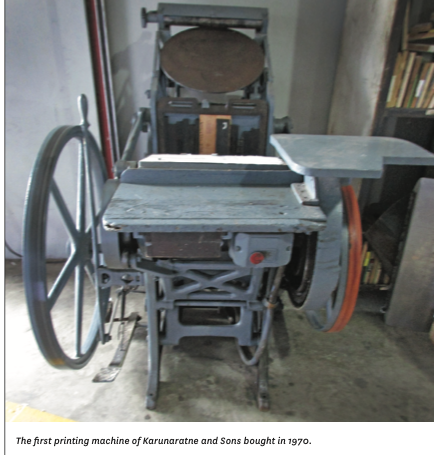
There was a school master that I used to meet everyday in the evenings. I told him about my situation and he took me to meet the Late Mr Wimal Abeysundara, who was a Radio Ceylon presenter. He had two printing machines lying idle and he said that I could use the machines in return for the payment of the electricity bill and a nominal monthly payment. I hired temporary workers and we completed the task. These were all bill books, we had to unload the printing material in Maradana cut to the required size, transfer it to Pannipitiya where gathering, numbering and binding was done and again transport the quantity to Maradana for trimming. I worked day and night. Within six months I was able to get my own premises in Maradana for 45,000 rupees. From that moment we continued to grow.
My fluency in the English language helped me to pick up the business easily as I was able to converse with the clients when I went to companies seeking business. I was able to securework from many of the foreign embassies. I first received work from the Russian Embassy from there onwards I received work from the German Embassy, French Embassy and so on. Gradually the business grew and I was able to purchase my second machine. In 1984, I ventured into off-set printing and I was one of the first to do so. Then I was the first to import and use Apple Macintosh computers in the printing industry. Apple was not available in Sri Lanka at that time. There were no email or internet facilities. Apple computers were bought for type-setting. The fact that I had Apple computers and a VT600 printer gave me a very good reputation. As the work increased, our premises was too small for the amount of work we had to do. By that time, I had sent Ravi, my elder son, to the UK for education, because after buying computers I realized that someone in the business should know the technology. This was of paramount importance for the business to go forward. I sent him to Watford College in the UK to study printing. Once he finished his studies and returned to Sri Lanka I had already shifted the press to Homagama. I bought the land from the industrial park and constructed the buildings and expanded our services. Ravi was made to work from the very bottom so that he could learn all aspects of the trade. I ensured that he had practical training as well. In 1998, we were selected as the best printer by the Chamber of Commerce. In 2003, which was my 70th birthday I decided to handover the responsibility to my children. By that time all my five children had completed their studies overseas except for one girl. All of them were married and had settled down. I had built houses for all of them and on my 70th birthday I did not keep anything for myself, I handed over everything to them. Thereafter I started the Karuna Trust.
It has been a long journey, and I have to thank my parents. In 1933, I was born in a very remote area called Hiniduma in Habarakada. At that time, I was the only one to travel to Galle and learnEnglish. I came to Galle in 1943, I had to walk four miles and then travel eight miles by ferry to Udugama and then take a bus to Galle. I came to my uncle’s place and went to school. I was a trouble maker during my school time. I had joined the Communist Party, Dakshina Lanka Shishya Sangamaya, which was run by S A Wickramasinghe’s Party. I was involved in all these activities and failed my SSC. I had the courage and the English language helped me to progress.
My fluency in the English language helped me to pick up the business easily as I was able to converse with the clients when I went to companies seeking business.
What are the challenges you faced and how did you overcome these challenges? What are the lessons we can learn?
Whatever the challenges you must always have the will to work hard. I was staying at my uncle’s place for my schooling. I had to face many difficulties there, due to those I left the school and went back home. Our mathematics teacher Mr Wimat Silva, was very good and kind to me because I was the best in the class for mathematics. Though I failed the SSC, I got a credit pass for Mathematics. He liked me very much so when I was missing school for SSC prep, he sent me a message through a friend of mine to come and see him. He asked me to continue my studies, I said I had left my uncle who was one of the richest men in the area, if I stay somewhere outside it would be an insult for him given his class level. He immediately asked me to come and stay with him and said that no one can find fault because it was for my studies. I stayed in his house for two years. He did not charge me any money. His mother was very kind to me and helped me turn my life around. I stopped all my bad conduct. Everyday in the morning I would go with Sudu Achchi to worship. As her youngest son was in Australia at that time she treated me like her youngest son. I changed my life from there.
As I did not pass my SSC I had to return home and once again I’ve resumed my political work. My father was a hard core UNPer and he was against my political work. There was alwaysdisagreement between my father and me on policy issues and he used to always scold me for my association with the Communist Party. It was going on like this and ultimately the situation exploded. One of my uncles came and said, “son you can no longer stay here, go and stay with your brother in Colombo”. This was in 1956, he gave me ten rupees and I came to Colombo. I did not stay with my brother, I stayed with one of my aunts who was married to a Police Inspector and they were staying in Maradana. I was searching for a job when I met a classmate of mine who was working for a bus company. He helped me to get a job in the company and I worked there for about three years. Following the nationalization of private bus companies, I somehow managed to get a position at the Ceylon Transport Board (CTB). My appointment was in Anuradhapura. There was a mudalali who was a good friend of my father and I stayed with them. At that time they were staying in the old town. Their house was about 200m from the Jaya Sri Maha Bodhi. I used to worship the Bodhinwahanse daily and clean the place. I would go to the temple in the evening as well. I believe that blessed me.
I was staying with them and they did not charge me any money for my lodging or meals. They were vegetable traders and they had two stalls in the market. After work at the CTB I usedto go and work in the market since I could not simply stay with them without being of some service. I did all types of work including washing the vegetables. When the clerk was not there I did the accounts as well. After the clerk who was an old gentleman passed away I started doing the accounts. I saw the difference between working for someone and having your own business. I did not give my resignation to CTB but I stayed back and worked in the market for another six months.
I was looking for a business to start, when a friend of mine in Colombo said that there was a tea business owned by one of his friends for sale. I came to Colombo; the business was on Deans Road just near the Fathima Church. At that time the Fathima Church was not yet constructed. The business was a small place with two bicycles and carrier boxes. I did not know anything about tea. I knew how to drink tea but I did not know anything about running a tea business. The owner asked for 3,000 rupees but I bargained and brought the price down to 2,000 rupees and I purchased the business. There was a delivery boy, he showed me the places and also where to buy tea. Within two weeks that boy left and I was wondering what to do. I wore a pair of shorts and started delivering the tea myself until I could hire another delivery boy. After three weeks I was able to hire a delivery boy. My elder brother worked at the Customs and one of his friends helped me greatly. There were many canteens inside the harbor and generally they do not allow outside tea to be brought in. But my brother’s friend managed to get me a pass and I was able to deliver tea to these canteens. We had to deliver the tea at 5.30 in the morning everyday. I would go with the delivery boy and deliver the parcels and then in the evenings I would collect the money. We made a decent income with that business. I was able to buy a van within six months and take the business to the next level. As I was making an income I asked my eldest younger brother, who had passed his SSC and was at home to come and work with me. He worked hard so I gave him 50 percent of the business and when we were improving we bought another van a few months later. Since we were doing well I asked my other brother to join us as well. The company was running very well and we made a sufficient growth. However, after my marriage my relationship with my brothers went downhill. I gave everything to them and I walked out of that business.
I joined the Sri Lanka Association of Printers after three years in printing business. Then I became a member of the Printers Cooperative, the day I joined as a member I was elected as thechairman as well. At the first AGM itself they selected me as the chairman. During that time Maradana was an area full of thugs and everyone had to pay protection money. I never gave a single cent to them. I faced many issues but I never gave them anything. Those days the thugs did not come with bombs they come with swords. Every worker of mine had a sword in his station and I was able to stand up to the situation.
The Printers Cooperative Society building was fully occupied by the thugs those days. During my first year as the chairman of the Society I built a wall, sacked all the staff, and improved the place. I started as a member at the Sri Lanka Association of Printers as well, then I became the additional secretary, secretary, treasurer, vice president and the president. They honored me with the lifetime achievement award. The establishment of the Sri Lanka Institute of Printing was a proposal of mine. I was on the board of governors for 20 years. I was a member of the Wages Board and on the board of directors of the National Apprentice Board. I also served as an advisor to the Tertiary and Vocational Education Commission. I was a vice chairman of the All Ceylon Buddhist Congress. While being engaged in business I was able to do social work as well. I have traveled to over 40 countries, and I am now using my sixth passport.
Whatever the challenges you must always have the will to work hard.
When you started in the 1970s, even in terms of the economy it was very tough. How did you develop the business?
It was hard work, prompt delivery, and quality. Maintaining a good relationship with the customers was very important. My customers were like friends. Many heads of government departments helped me. One such person was Mr Ranjan Wijeratne, he gave me a lot of work. At the time President J R Jayewardene first came into power they wanted us to print the gazette notification, which stated that any bare land would be acquired by the Government for cultivation purposes. The quotation was for 200,000 rupees at that time. I gave the quotation and they asked us to start the work, firstly with 25,000. I printed 25,000 and delivered it to them but they did not ask me to do the balance. I was waiting for a long time, and also for the money for the work we had already completed. After about three-four months I went and met Mr Wijeratne, I explained to him that I had printed 25,000 and I had also purchased the paper for the total quantity and blocked the funds as well. He asked me to bring the invoice for the total amount. I gave the invoice and the next day I received the cheque. From that 200,000 rupees I built our house. At that time Pieter Keuneman had brought in a ruling stating that a house could not be more than 2,000sq ft. Using that 200,000 as seed money I managed to build a very good house. I brought all the timber, which was jak wood from my hometown, and the roof tiles were Sinhala Ulu.
It was hard work, prompt delivery, and quality. Maintaining a good relationship with the customers was very important. My customers were like friends.
There are so many printers but no one keeps to the standards that was there before. What is your advice to them?
Those days there was no difficulty because when a customer comes we take 50 percent advance and when the job is completed, they have to pay the balance and take it. In my lifetime I have not taken a single cent as loans. There was no need to take loans because customers pay advance and after completing the job they pay the money. Today, credit is given for two to three months and some even longer. To do quality work, to be accurate, prompt time, and customer relationship are the most important aspects in printing. Today it is the marketing staff that coordinate with the client but during those days it was not so. We did not have any marketing staff. I would personally go to the client, meet them and build the relationship with them. Today, though there is competition if you do quality work and deliver promptly, and have a good relationship with the customers, no one can beat you.
We are sending printing overseas, where Sri Lanka can do much better. What are your thoughts?
During that time, there were many people asking for off-set printing from overseas and I also had to get some of my printing done in Singapore. However, I was able to prove to clients that I could do the same quality here, so then those clients stopped asking for the printing to be done in Singapore. If the client is satisfied with the quality and the price they will not ask for the printing to be done overseas. It is for this reason that you need to have the relationship with the customer. When you are very close to the customer they will not ask you to do the printing overseas. If you prove to the customer that you can do a better work for a better price I do not think any customer will ask you to import anything from outside. Our Association was very strong those days and we fought for this. We were very active but it is not so today.
Once I was selected by the EDB for a World Bank funded project where they wanted a printer to do promotion work for two years. Many printers applied and I had only one machine but I applied for the work as well. After the interview process I was selected. There was an European official on the panel. Ravi was in the UK at that time and I got the chance of seeing him every three months. I used to participate in all the book fairs; such as the London Book Fair, Frankfurt Book Fair, Singapore Book Fair, and the Indian World Book Fair. The project would pay for the cost of the stall, air fare, accommodation and all other expenses. For two years, every three months I visited a foreign country.
I built up the business of exporting books by taking a practical approach. From the export earnings I was able to educate my children. I opened a bank account in the UK. I closed that account only recently. I did a comprehensive catalog about Sri Lanka, featuring Buddhism, culture, history, and nature. I was able to acquire a directory that contained all the international libraries and I mailed this book to all of them. In this manner, I gradually built up my export portfolio and every month I used to send about 200-300 books overseas. I earned very good profits, which I banked in the UK. Clients sent the money to that account as it was more convenient. The only wrong thing I did was not bringing that money to Sri Lanka, but if I brought the money to Sri Lanka then I would not have been able to send my children abroad for their education. Because the exchange control was very strict at that time. Thus, I was able to spend for their education and bring a bunch of educated kids back to Sri Lanka.
Did you ever think you would achieve so much in life, when you first started?
I never thought I would come to this stage. But it is due to my hard work. No one in my family was in business. My father was a well reputed planter. It was while I worked in the market in Anuradhapura for the mudalali that taught me the difference between business and working for someone else.
I never thought about the future. I worked then and there. There is a saying ‘think before you jump’. I would always jump and then think how to come out. If not, you would be only thinking how to do the work. I will do what I feel is right, even today it is the same, I do not ask anyone. I do it. Ultimately you will be successful. I always work on the gut feeling. It is good to do planning, but most of the people are failures. Without planning I did everything and I was a success. That is my hard work and luck.
I was able to prove to clients that I could do the same quality here, so then those clients stopped asking for the printing to be done in Singapore. If the client is satisfied with the quality and the price they will not ask for the printing to be done overseas.
Why did you form the Karuna Trust?
On my 70th birthday I thought, I have done everything in my life I have given a good education to my children, they are all employed and now the business has come to a certain level. I thought there was no other reason to work hard and earn money. As a father, as a citizen I have done my work. I thought I must do something for the country as well. From my childhood I have done social work, at school I was the chairman of the Buddhist Society then gradually I worked with the Dakshina Lanka Shishya Sangamaya, where I was the secretary. Even while I was engaged in my business I was doing social work with the All Ceylon Buddhist Congress.
On my 70th birthday, I thought of giving up money making and to do some service to the country, to the religion, and for the younger generation. That is the reason I started the KarunaTrust. I made an initial deposit of 1.5 million rupees, from that it has now increased to 102 million rupees. Karuna Trust earned a good income from the press, by selling the waste paper and used plates, these funds have been given to the Trust since 2003. I did not spend the funds but from the interest earned I do all the work of the Trust. In about two years I asked my customers and suppliers to donate for this good purpose. My youngest son Mangala developed the website for me and we gradually formed international connections.
For the COVID-19 relief work on March 30, 2020, I’ve sent an email to about 200 donors, within ten days I received 3.4 million rupees. Just like printing, I have gradually developed my social work through the Karuna Trust. I personally send all the emails and reply to them. Whenever I do project I immediately send the photographs to the donors. We have about 2,000 addresses. I always email the donors, updating them on the work that I am doing, so that people know that I am working. Whatever donations we get for the Trust we use it for the work. We do not take anything for administration. There are no employees so there are no overhead costs. There are no administration costs because everything is done by Karunaratne and Sons. Whatever the money we get for the Trust we spend it on the projects.
In 2003 Ravi bought a building in Attanaglla to start a handloom factory. Once I went there I saw a family living in a structure that I cannot even call a hut. It was just covered in polythene. Their job was washing clothes, there were two children, a girl and a boy and I felt that I should build a house for them. That is how I started. In a few months I built a good house for them. Thereafter I built another house for different family in the same village itself.
I never thought I would come to this stage. But it is due to my hard work. No one in my family was in business… I never thought about the future. I worked then and there. There is a saying ‘think before you jump’. I would always jump and then think how to come out.
This was during the height of the war and I felt I needed to help the people in the threatened villages because they were facing terrorist attacks. I went to Anuradhapura and the GA was a cousin of mine. I spoke to him and he directed me to the Medawachchiya Division Secretary who was a very good person. He was honest and very hardworking. With the Ananda College 83/84 batch we went to the villages. We visited a school by the name of Gamini Wewa Vidyalaya. The school had a science teacher but no laboratory. We built a laboratory for the school and thereafter we built houses for the village because their houses had been destroyed in the war. There was another school, which had been destroyed and the children had to walk to another school, which was seven kilometers away. We first established a temporary building and we started the school. We later built a permanent building and several school buildings with many toilets as well.
Then through the Karuna Trust we did community development. We gave clay modeling machines to potters. We provided clay grinding machines, where I built a small building as well. Then scholarships, from 2003 onwards, every year I gave 100 scholarships. In 2015, I reduced the number of scholarships because I started the cataract operations. I found that this is more important. Even within school children there areabout four to seven percent with poor eyesight. There are some children with low vision, we met several children like that and directed them to Kandy. Till 2015, I have been doing all other work but once I joined Vision 2020 and saw the condition of the poor people in the villages I knew I had to help them. In every hospital there are 2,000-3,000 patients on the waiting list. I started in a small way with 150,000 rupees but I started to get many donations. Because people trusted me in the way that I was doing the work. The family is also involved. I got six-seven million rupees every year from Karunaratne and Sons, by selling used plates, waster paper and so on. Gradually we have been able to increase the work we do. As a single person I have been able to do a lot of things, the amount of work that I have done I cannot imagine. At my age I am using the computer and doing all the email communications by myself. When I was in the US with my children, my daughter Nisansala taught me how to send emails and print letters. If you want to do anything you can do it. Where there’s a will, there is a way.
During the lockdown period, I was very busy. While at home I was able to distribute dry rations to 3,412 families from the South to the North; Trincomalee, Horana, Angunawanthota, Hiniduma, Maharagama, Hanwella, Matale district, Vavuniya, and Anuradhapura. I managed to do all the work by using the telephone and computer; I managed to collect money and send the money for the work, without stepping out from the home. Those days I was on the telephone and computer for 12-14 hours. I had to arrange for photographers because I was emailing to donors then and there to show that their money had been used for the right purpose. Ultimately I got about 4.5 million rupees in donations.
On my 70th birthday, I thought of giving up money making and to do some service to the country, to the religion, and for the younger generation. That is the reason I started the Karuna Trust.
Very few people start a Trust in their retirement?
I was doing social work even before but with the business I was not able to do to this extent. At the age of 70 many people would not give up their business. Many people continue to work as muchastheycan.IfIdidnotgiveupatthatagemy children would not have picked up the work. But I gave the responsibility to them. If I kept it in my hands the business would not have ventured into new areas that my son introduced. They have no control over me. When I need money I go and get money. I do not have any cent but I get everything. My children look after my wife and me.
What made you get into eye health?
The previous Director General of Health is married to a niece of mine, who is a doctor as well and she asked me join in this work. I started working with them. When Dr Mahipala left the Health Department, Vision 2020 declined. When it collapsed I thought I should do it on my own. I was able to form my own team of eye surgeons and every month we do about 150 cataract surgeries spending 1.5 million rupees a month. I thought after COVID-19 I would not be able to continue but everything is going smoothly.
If I did not give up at that age my children would not have picked up the work. But I gave the responsibility to them.
Even recently I went to Padaviya with my wife, and we opened an eye unit in the Padaviya hospital.
There are eye units in the National Hospital in Colombo, Kalubowila, Panadura, Horana, Homagama, and Gampaha. Initially when we were doing the clinic and I would ask people why they are not going to the hospital they would say that they cannot waste their time and that is why they are coming to the clinic to get the service free of charge. I was running a clinic in Maharagama, I closed it down as there is no point in keeping a clinic. We should not help them for their laziness.
I gave the Kahawatta Hospital a machine. Usually in the clinic for three years we had seen only about 3,000 patients but for a week the hospital had seen over 500. From Kahawatta theyhave to come to Ratnapura and then wait on the waiting list, they have to get the numbers and only 30-40 patients are seen during the day. There are many barriers. Now that the Kahawatta Hospital has the facilities, people can come and get their numbers easily. The facilities and services should be accessible to the people. I am doing a greater service by giving the machines to these areas. We have few more machines that I hope to distribute as well. There is a small hospital in my hometown to which I will donate the machines.
Age is only a number. I have learnt how to work on the computer, send emails, take print outs and do many more things using technology because I always believed that I can.
How do you choose the patients?
Earlier we had eye camps but I found that it is not necessary because in every hospital there are patients on the waiting list for more than two-three years. If they can do it themselves, theywill not wait that long. We have selected a few hospitals; Kahawatte hospital, Kitulgala hospital, then Padaviya, Kolonna, Sabaragamuwa Province all the hospitals, and Hambantota. The patients are coming directly from the hospitals. Previously the patients had to come to Colombo three times; that is for the operation, then post operation checking after one week and there after one month. Now the hospitals send the patients to us and we have to only do the operation and they take care of all other aspects. I save money that way, and the patients also need to come to Colombo only once. From Padaviya they used to travel to Colombo three times but now that we have opened an eye unit, they do not need to do so. They have to only come to do the surgery. They have the required equipment and surgeons come once a week from Anuradhapura to do the surgery.
What would you like to say as advice to the younger generations?
Helping a poor man, giving sight to a person who has had the sight and then lost their sight, I believe is a great merit. If they can think about the poor people without spending on a luxury life and unnecessary comforts, or at least limit that and make a donation to eye care, that would be a great achievement.
You should always work hard and believe in yourself. I made decisions on my own and I trusted my ‘gut’ feeling. If you are honest and determined, you will always be successful. Where-ever I worked, or did as business, I started from the beginning and I knew how everything worked. I am a self-made man. It is also important to learn the English language if you want to do well in life.What I was able to achieve in my business and the work done at the Karuna Trust was due to my ability to communicate in English. Furthermore, age is no barrier to learn something new. Age is only a number. I have learnt how to work on the computer, send emails, take print outs and do many more things using technology because I always believed that I can.
During your life as you earn a living, it is essential to also help others. It gives you a satisfaction than money could ever do. I am happy that on my 70th birthday I decided to stop being engaged in the business and decided to dedicate my life to social work. While I always ensured that I helped others during my entire life while doing business as well, I am able to use more of my time and energy to help those who are in need. It is a blessing to help others. I advice the younger generation to also think in this way.
